Your Basket is Empty
🎁🎅🎄MERRY CHRISTMAS & A HAPPY NEW YEAR!☃️❄️🦌
🎁🎅🎄MERRY CHRISTMAS & A HAPPY NEW YEAR!☃️❄️🦌
🎁🎅🎄MERRY CHRISTMAS & A HAPPY NEW YEAR!☃️❄️🦌
🎁🎅🎄MERRY CHRISTMAS & A HAPPY NEW YEAR!☃️❄️🦌
Free bookmark with every purchase of new books - add both to basket - discount applied at checkout.
Free bookmark with every purchase of new books - add both to basket - discount applied at checkout.
6 min read
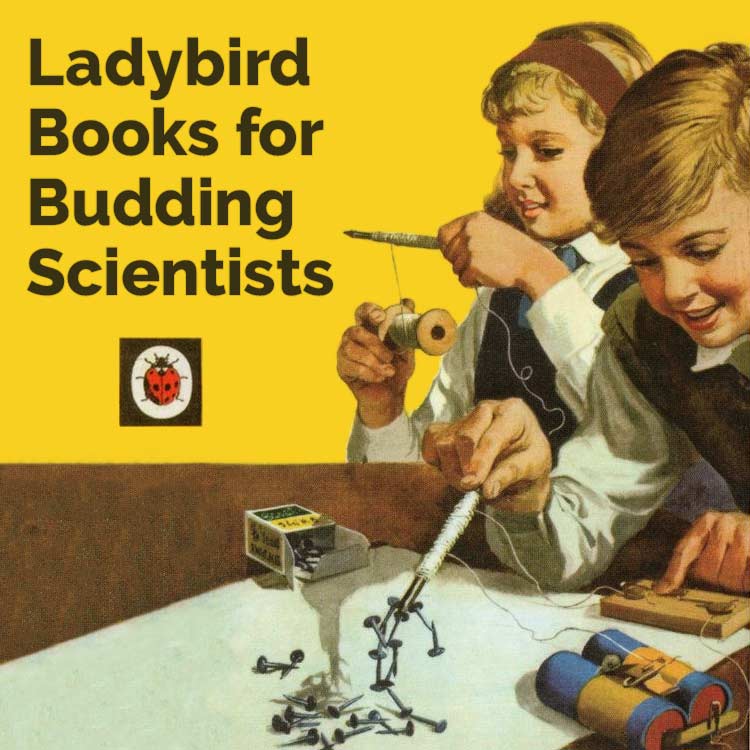
The iconic Ladybird world stretches from the 1950s through to the late 1970s. By the 80s, as Britain and indeed the world was changing, Ladybird wasn’t changing at the same pace and there was a feeling that the books were somewhat naive and old-fashioned. Now, in the 21st century we can re-evaluate their impressive legacy.
Ladybirds were the first children’s books designed entirely with the child in mind. The format never changed – 56 pocket-sized pages, text on the left (with age-appropriate language, font and spacing) and, crucially, a full-page colour illustration on the right, always carefully designed to hold the gaze of a child. Up until then, children’s books typically had a colour illustration on the cover and the occasional black and white drawing inside. This was partly production costs of course but mainly that no one had stopped to think about what children wanted. Ladybird was the first publishing house to see through a child’s eyes.
Employing a relatively small number of expert writers and highly talented illustrators, Ladybird dominated publishing for children in the post-war and baby-boom years. Here we take a closer look at a small selection of their titles for the budding scientist.
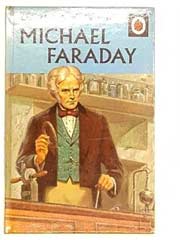
Telling the story of Michael Faraday, one of the world’s most life-changing scientists whose achievements included the invention of the electro-magnetic motor, revolutionising technology, this vintage Ladybird was published in their series 708 of Great Scientists. The illustrator Roger Hall was entirely self-taught, studying portraiture from the age of 15 through solo visits to the Tate and National Galleries. Interesting Ladybird fact: in 1955 Roger Hall was the first artist to draw James Bond on the first Pan Books paperback edition of Casino Royale (featuring the first famous blonde Bond).

This is the first book in the Conservation series, 727, and was both written and illustrated by John Leigh-Pemberton. These books were ahead of their time with their focus on the dangers of neglecting our environment. This was a topic close to the heart of Ladybird editorial director, Douglas Keen who was determined that this ecological message be emphasised in a series of Ladybird books before he retired. With a background in the English landed gentry and a decorated RAF hero from the Second World War, John Leigh-Pemberton undertook artistic commissions for the Shell Guides series, however his best-known work was carried out for Ladybird where he single-handedly produced many of the series dealing with natural history subjects.
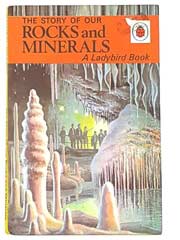
Before working on at least 40 Ladybird books, accomplished illustrator Robert Ayton had produced 250 comic strips for the Eagle group, mainly under the title of ‘Jack O’ Lantern’, and before that had worked an advertising artist for household names such as Rolls Royce and Castrol Oil. Ladybird collectors appreciate Ayton for his consummate skill in bringing a static, inanimate object to life – perfect for children and seemingly ‘dry’ subjects such as this one on geology.
Perfect for the aspiring medic interested in animal and human dentistry this 1978 publication in the Ladybird Leader 737 series was written by Sandra Halford and illustrated by Vernon Mills and others. In the 1970s, under a new regime At Ladybird, all the senior editorial managers (including Editorial Director Vernon Mills) helped to write and illustrate a number of Ladybird books each. Partly this was because Ladybird’s target market age group was becoming steadily younger and the need for experts, less pressing, but also to save on costs. Part of Ladybird’s commercial success came from the fact that they almost never paid royalties to anyone – neither writer nor artist. Both artists and writers were paid a flat fee on delivery of the work. Interesting Ladybird fact: If Ladybird managers wrote books it was seen as part of their job. They received no income or royalty of any kind.
One of the 737 ‘Leader’ series, Sounds was written by Allan P. Sanday and illustrated throughout by Bernard H. Robinson. Robinson was one of the artistic stalwarts of Ladybird, covering a fifteen year period from 1965 to 1980. An accomplished jazz musician, Robinson initially worked on technical drawings for the Royal Navy but went on to set up his own studio at home and become self-employed. This book informed children of the many different sounds they heard including sounds in the street, the countryside and at home, and explains what soundwaves are, the speed of sound etc. ‘Bang on’ for your collection of Ladybird science!
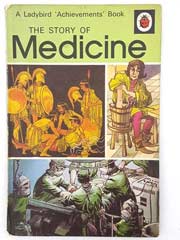
From the 601 ‘Achievements’ series, Written by Edmund Hunter and illustrated by Robert Ayton (See Rocks and Minerals above) this is the story of Man's struggle against disease, a struggle which began in prehistoric times and continued through periods of advance and enlightenment, ignorance and disbelief. The story continues in an era of fantastic medical progress in which machines reproduce body functions and human organs are passed on from one person to another. These pages will be carefully dissected by the aspiring doctor or surgeon.
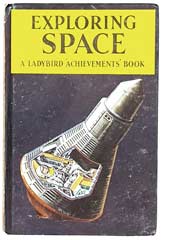
Exploring Space was first published in 1964 and was the 9th title in the long-running Achievements series, 601. It was illustrated by the brilliant visual-storyteller Robert Ayton and was written by astronomer Roy Worvill. This book was the first Ladybird to be published with a dust-wrapper. As this book was published just before the first moon landing, it was revised shortly afterwards in the light of new understanding, new facts and new confidence. This is the original pre moon landing version.
For the revised version, and a fascinating look at how understanding changed in a relatively short space of time, follow this link and safely land both copies into your collection.
Interesting Ladybird fact: The Virgin Galactic chief test pilot, David MacKay, took a copy of the Ladybird “Exploring Space” with him on their first space flight in February 2019 because it had inspired him as a boy to become an astronaut.
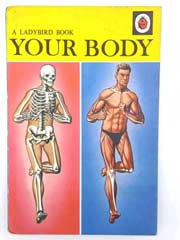
From the 536 ‘Nature’ series, author of this title David Scott Daniell (1906-65) was a prolific writer of both adult and children’s fiction and reference books – 98 works in total!
Sir Winston Churchill asked Daniell to write the history of Churchill’s own regiment, the 4th Queen’s Own Hussars. After ‘Your Body’, Daniell used his pen-name ‘Richard Bowood’ for all further Ladybird books. Find your favourite Bowood here.
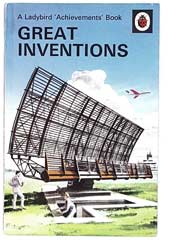
Great Inventions was first published in 1961 and was only the second title in the long-running Achievements series, 601. It was illustrated by the brilliant visual-storyteller Robert Ayton and was written by Richard Bowood (see above).
The inventions celebrated in the book are discussed in chronological order, one page per invention, and range from The Telescope, through to Atomic Energy.

The Ladybird Leaders series were created for the younger child to act as “first informaton books”. Written in clear, simple prose they provide an excellent introduction to non-fiction topics for primary-school children and even today create a sound basis for project work. Another work of illustrative genius from the pen and brush of Brian Robinson, this collectable edition is perfect for the young natural historian – and what young child doesn’t love a Tyrannosaurus Rex or Diplodocus?
Covering a universal range of scientific research from electronics to medicine, natural history to engineering, the inventors and inventions, discoverers and discoveries, Ladybird published an impressive array of carefully written and beautifully illustrated books for the young, enquiring mind. Here at Country House Library we’re proud to stock hundreds of the best vintage examples from this publishing legend of the 20th century.
4 min read
6 min read
4 min read
Sign up to our newsletter for weekly book news, exclusive offers and more...